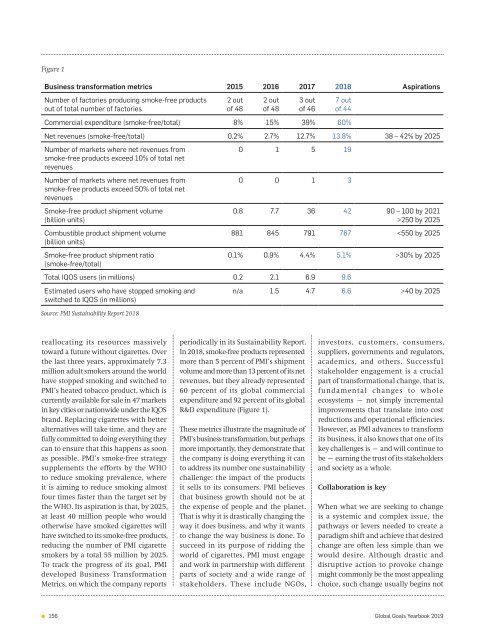Aliging Profit with Purpose - Global Goals Yearbook 2019
What are companies for? The rules for companies have changed. The focus is increasingly on their sustainable, social, and ecological impacts. The strategic orientation toward the so-called corporate purpose is decisive for profitable growth in the future. This currently results in a large number of questions for businesses: How do you find an inspiring and future-oriented corporate purpose, and how can it be aligned in such a way that it brings profitable growth and social responsibility in concert? The new 2019 edition of the Global Goals Yearbook offers answers to these crucial questions thanks to its consistent orientation toward the UN Sustainable Development Goals and a competent editorial board and author pool.
What are companies for? The rules for companies have changed. The focus is increasingly on their sustainable, social, and ecological impacts. The strategic orientation toward the so-called corporate purpose is decisive for profitable growth in the future.
This currently results in a large number of questions for businesses: How do you find an inspiring and future-oriented corporate purpose, and how can it be aligned in such a way that it brings profitable growth and social responsibility in concert? The new 2019 edition of the Global Goals Yearbook offers answers to these crucial questions thanks to its consistent orientation toward the UN Sustainable Development Goals and a competent editorial board and author pool.
Create successful ePaper yourself
Turn your PDF publications into a flip-book with our unique Google optimized e-Paper software.
Figure 1<br />
Business transformation metrics 2015 2016 2017 2018 Aspirations<br />
Number of factories producing smoke-free products<br />
out of total number of factories<br />
2 out<br />
of 48<br />
2 out<br />
of 48<br />
3 out<br />
of 46<br />
7 out<br />
of 44<br />
Commercial expenditure (smoke-free/total) 8% 15% 39% 60%<br />
Net revenues (smoke-free/total) 0.2% 2.7% 12.7% 13.8% 38 – 42% by 2025<br />
Number of markets where net revenues from<br />
smoke-free products exceed 10% of total net<br />
revenues<br />
Number of markets where net revenues from<br />
smoke-free products exceed 50% of total net<br />
revenues<br />
Smoke-free product shipment volume<br />
(billion units)<br />
Combustible product shipment volume<br />
(billion units)<br />
Smoke-free product shipment ratio<br />
(smoke-free/total)<br />
0 1 5 19<br />
0 0 1 3<br />
0.8 7.7 36 42 90 – 100 by 2021<br />
>250 by 2025<br />
881 845 791 767 30% by 2025<br />
Total IQOS users (in millions) 0.2 2.1 6.9 9.6<br />
Estimated users who have stopped smoking and<br />
switched to IQOS (in millions)<br />
Source: PMI Sustainability Report 2018<br />
n/a 1.5 4.7 6.6 >40 by 2025<br />
reallocating its resources massively<br />
toward a future <strong>with</strong>out cigarettes. Over<br />
the last three years, approximately 7.3<br />
million adult smokers around the world<br />
have stopped smoking and switched to<br />
PMI’s heated tobacco product, which is<br />
currently available for sale in 47 markets<br />
in key cities or nationwide under the IQOS<br />
brand. Replacing cigarettes <strong>with</strong> better<br />
alternatives will take time, and they are<br />
fully committed to doing everything they<br />
can to ensure that this happens as soon<br />
as possible. PMI’s smoke-free strategy<br />
supplements the efforts by the WHO<br />
to reduce smoking prevalence, where<br />
it is aiming to reduce smoking almost<br />
four times faster than the target set by<br />
the WHO. Its aspiration is that, by 2025,<br />
at least 40 million people who would<br />
otherwise have smoked cigarettes will<br />
have switched to its smoke-free products,<br />
reducing the number of PMI cigarette<br />
smokers by a total 55 million by 2025.<br />
To track the progress of its goal, PMI<br />
developed Business Transformation<br />
Metrics, on which the company reports<br />
periodically in its Sustainability Report.<br />
In 2018, smoke-free products represented<br />
more than 5 percent of PMI’s shipment<br />
volume and more than 13 percent of its net<br />
revenues, but they already represented<br />
60 percent of its global commercial<br />
expenditure and 92 percent of its global<br />
R&D expenditure (Figure 1).<br />
These metrics illustrate the magnitude of<br />
PMI’s business transformation, but perhaps<br />
more importantly, they demonstrate that<br />
the company is doing everything it can<br />
to address its number one sustainability<br />
challenge: the impact of the products<br />
it sells to its consumers. PMI believes<br />
that business growth should not be at<br />
the expense of people and the planet.<br />
That is why it is drastically changing the<br />
way it does business, and why it wants<br />
to change the way business is done. To<br />
succeed in its purpose of ridding the<br />
world of cigarettes, PMI must engage<br />
and work in partnership <strong>with</strong> different<br />
parts of society and a wide range of<br />
stakeholders. These include NGOs,<br />
investors, customers, consumers,<br />
suppliers, governments and regulators,<br />
academics, and others. Successful<br />
stakeholder engagement is a crucial<br />
part of transformational change, that is,<br />
fundamental changes to whole<br />
ecosystems – not simply incremental<br />
improvements that translate into cost<br />
reductions and operational efficiencies.<br />
However, as PMI advances to transform<br />
its business, it also knows that one of its<br />
key challenges is – and will continue to<br />
be – earning the trust of its stakeholders<br />
and society as a whole.<br />
Collaboration is key<br />
When what we are seeking to change<br />
is a systemic and complex issue, the<br />
pathways or levers needed to create a<br />
paradigm shift and achieve that desired<br />
change are often less simple than we<br />
would desire. Although drastic and<br />
disruptive action to provoke change<br />
might commonly be the most appealing<br />
choice, such change usually begins not<br />
156<br />
<strong>Global</strong> <strong>Goals</strong> <strong>Yearbook</strong> <strong>2019</strong>

















